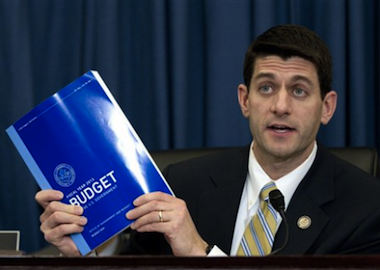Six members of the Supreme Court are Catholics. Speaker of the House, John Boehner, and Senate minority leader Mitch McConnell are Catholics. Also in this new Catholic dynasty is the alleged wunderkind of Republican economics: perky Paul Ryan. Ryan wears his form of Catholicism with a jaunty pride, declaring that “Catholic social doctrine is indispensable for officeholders.”
But, ah, there’s the rub. Neither Ryan nor the right-wing bishops who coddle him, nor five of the Catholic Supreme Court justices, have done their homework. They are handling theopolitical dynamite which, if applied, would explode their right-wing projects into a fine and smelly dust.
“Catholic social teaching” is a too often overlooked treasure of social justice theory and it’s been growing even more impressive over the past two centuries. This teaching is not fringe; it is papal to the core. It is “a pity beyond all telling” that Catholic bishops, obsessed with condoms and such, could not raise their passions and attention above the pelvic zone and shout from the rooftops a message that is crucially and brilliantly relevant to a global political economy on the brink of total collapse.
In October 2011, Pope Benedict’s Pontifical Council on Justice and Peace presented in capsule form this social critique which has roots reaching all the way back to the Hebrew Bible. Like panicked devils shrinking from God’s face in a medieval tapestry, right-wing Catholics shrieked in pain and fell over themselves belittling it. The epithets flew with inquisitorial venom: “incompetent babble on financial reform,” railed Nicholas Hahn; it isn’t authoritative and can be ignored, insists George Weigel, the redoubtable Catholic apostle of right-wing-think.
The Vatican Joins Occupy
Their pain is understandable. The document is in sync with the Occupy Wall Street movement. Cardinal Peter Turkson, the Cardinal president of the council that produced the document said as much: “The basic sentiment behind the protests [the “occupy” protests] is in line with Catholic social teaching.”
And lest anyone attempt to claim that the document is merely the obscure ravings of a minor council: according to the Guardian UK, its secretary, Bishop Mario Toso, “stressed that the document was built on existing Vatican teaching, notably Pope Benedict XVI’s 2009 encyclical, titled Charity in Truth, which criticized free market fundamentalism.” That encyclical included clear and direct criticism of the free-market fundamentalism at the heart of attempts to dismantle financial reform:
The conviction that the economy must be autonomous, that it must be shielded from ‘influences’ of a moral character, has led man to abuse the economic process in a thoroughly destructive way. In the long term, these convictions have led to economic, social and political systems that trample upon personal and social freedom, and are therefore unable to deliver the justice that they promise.
Jesuit Thomas Reese said that the document is “closer to the view of Occupy Wall Street than anyone in the U.S. Congress.”
Would that it were true that, as Ryan said, “Catholic social teaching is indispensable for officeholders”! Mitt Romney’s description of Ryan’s budget as “marvelous” would no longer be ludicrous.
Like Jesus’ description of his own mission, the Vatican document is “good news for the poor.” (Luke 4:18) Ryan’s budget is not. Budgets show where the heart is: they are intensely moral documents. To budget-makers we can say: show me the losers and the winners, and I will tell you what you are.
Among the losers in the Ryan-Romney budget, are programs that help the 99 percent: medicaid, medicare, food stamps, health insurance (one-half of the $5 trillion in cuts over a decade would come from health care even though our health care potpourri is the worst in the developed world.) Other losers include: preschool programs, environmental and financial regulations, Pell grants, Head Start, and mortgage guarantees.
As to winners, it is the bloated rich who get help they do not need and could never deserve. As Robert Reich reports, in 2010 15,600 super-rich households (the top 1/10th of 1 percent) got 37 percent of all the economic gains that year with the rest going to those in the top 10 percent. The Ryan budget defends greed over need. Extend the tax breaks and further deregulate the dogs of greed. And as for the military, ah yes, the military, Ryan said they did not ask enough, though they have never been known for modesty in their requests. With the military budget around $2 million per minute, there is no need to further feed that black hole in the economy—but feed it Ryan would. Kill-power is prized more highly than Head Start and Medicare.
Enter the Real Catholic Social Teaching
When the real Catholic social teaching enters the conversation it’s nothing less than a wake-up call to the modern world.
The cumbersome title of the Vatican document signals its bold mission: Toward Reform in the International Financial and Monetary System in the Context of Global Public Authority. The Westphalian model giving sovereignty to individual states made sense in 1648. It makes no sense now given the interpenetration of economies and technology and our shared ecological peril. Our current need is for a Declaration of Interdependence and a “public, supranational authority with universal jurisdiction.” Pope after pope call for a “true world political authority” and a “world bank” to preside over a “global, universal common good.” Nations need to “transfer a part of each nation’s powers to a world authority and to regional authorities.”
What is called for is not a tyrannical despotic world authority. The Catholic tradition of “subsidiarity” means that nothing should be done by a higher authority that can be done by active participation at lower levels. Right-wingers like Paul Ryan grab that one word, “subsidiarity” and claim it supports their maniacal hatred of government. It doesn’t. It calls for a more active citizenship, not voter suppression. Internationally it calls for “a new model of a more cohesive, polyarchic international society that respects every people’s identity within the multifaceted riches of a single humanity.” The goal is a solidarity that would end poverty and obsessive reliance on military violence for security.
The Vatican document supports fair taxation, greed-controlling regulation and bailouts “with public funds” when necessary. It excoriates “neoliberalism,” the greed-is-good creed of the right wing. Maggie Thatcher used it, and when she entered office 1 out of 10 Britons was in poverty; when she left, 1 out of every 4 (1 in 3 children) was impoverished. Reagan was married to it—as are his worshiping successors—and the 99% continue to lose while the 1% gorge and the economy sinks. It’s not complicated. It’s dumb. And, as the Vatican says, it’s immoral.
Catholic social teaching is not wild-eyed idealism; it is a pragmatic realization that without the taming of greed and without poverty-ending sharing, we face global economic chaos.
To see that, just open your eyes.





